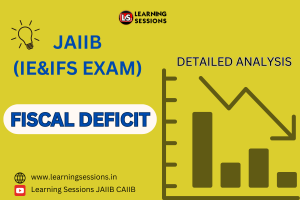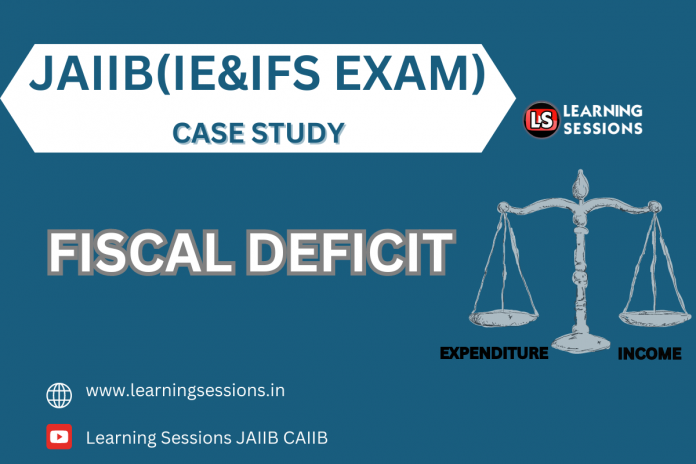The JAIIB exam’s Indian Economy (IE) and Indian Finance System (IFS) module is designed to provide insight into the fundamentals of banking operations. The concept of fiscal deficit is primary in understanding the economic health of a country. It represents the shortfall between the government’s total revenue and its total expenditure, excluding borrowings. Fiscal deficit is an important component of India’s public finance system and has a direct impact on economic growth, inflation, and financial stability. Learning Sessions provides this article that explores the case study on the relevance of fiscal deficit in the Indian context, particularly for candidates appearing for the JAIIB exam.

📚 JAIIB Study Resources 📚
👉 Check Here
👉 Check Here
👉 Check Here
👉 Get Tests Here
👉 Check Here
DOWNLOAD PDF FISCAL DEFICIT -CASE STUDY
The formula for fiscal deficit is:
Fiscal Deficit = Total Expenditure – (Revenue Receipts + Non-Debt Capital Receipts)
A fiscal deficit indicates that the government is spending more than it earns through taxes and other revenue sources. To bridge this gap, the government resorts to borrowing from domestic and international sources. For the extensive preparation of candidates, get details through our YouTube videos for JAIIB IE & IFS Module wise Syllabus with explanations and tips to help candidates in their preparation journey.
You may also like these JAIIB Case Studies:
JAIIB | IE & IFS | TREDS
JAIIB | IE & IFS | DERIVATIVES
There are two key components that contribute to the fiscal deficit that are Revenue Deficit and Capital Expenditure. Revenue Deficit refers to the shortfall in the government’s revenue receipts compared to its revenue expenditures. A revenue deficit indicates that the government is not generating enough revenue to meet its operational expenses. Capital Expenditure includes spending on infrastructure, defense, and other long-term projects that aim to improve the country’s productive capacity. Though capital expenditure adds to the fiscal deficit, it is often seen as more valuable since it leads to boost future growth. Learning Sessions provides additional information about JAIIB IE & IFS EARLY STAGE FINANCING by giving examples of real life scenarios.
To sum it up, the fiscal deficit is an analytic indicator of the government’s financial health and has far-reaching suggestions for the Indian economy and financial system. For banking professionals, fiscal deficit trends provide valuable insights into macroeconomic conditions that influence banking strategies, investments, and lending practices.
Learn more about this case study through our YouTube channel and PDF.
Get access to our Telegram Channel for free Pdfs of JAIIB.





